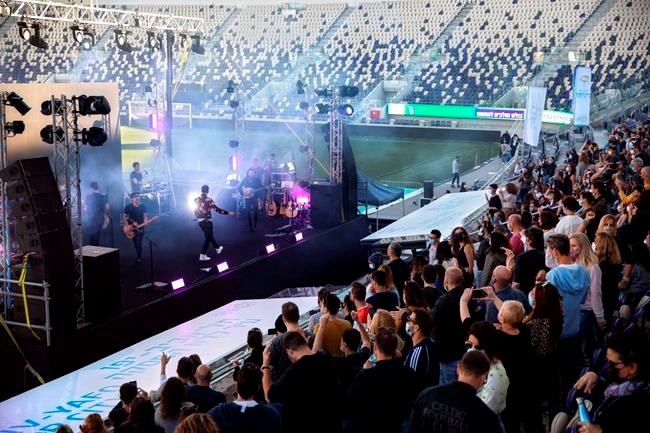JERUSALEM — Israel reopened most of its economy Sunday as it removed many of its remaining coronavirus lockdown restrictions, lifted by its successful vaccination campaign and giving a boost to Prime Minister Benjamin Netanyahu's re-election hopes.
The easing of restrictions comes after months of government-imposed shutdowns and less than three weeks before the country’s fourth parliamentary elections in two years. Israel, a world leader in vaccinations per capita, has fully immunized nearly 40% of its population in just over two months.
Bars and restaurants, event halls, sporting events, hotels and all primary and secondary schools that had been closed to the public for months were permitted to reopen Sunday. Some restrictions remained on crowd sizes, and certain places were open to the vaccinated only.
“We're very happy that this day came. We've been preparing for this day for a very long time,” said Assaf Obsfeld, a Jerusalem coffee shop owner who was checking customers to ensure they had been vaccinated.
“It’s a stressful situation because we really don’t know how to handle everybody,” he said.
Netanyahu's government approved the easing of limitations Saturday night, including the reopening of the main international airport to a limited number of incoming passengers each day.
Netanyahu is campaigning for re-election as Israel's coronavirus vaccine champion at the same time that he is on trial for corruption.
Israel has sped ahead with its immunization campaign. Over 52% of its population of 9.3 million has received one dose and almost 40% two doses of the Pfizer vaccine, one of the highest rates per capita in the world.
Nearly 90% of the country's over-50 population has either been vaccinated or recovered from the coronavirus. With that high-risk population largely innoculated, decision makers have concluded it is safe enough to reopen more parts of the economy.
Netanyahu appears to be banking that some semblance of normalcy will lift his re-election prospects. Opinion polls show him locked in a race against a field of challenges that is too close to call.
While vaccination rates continue to steadily rise and the number of serious cases of COVID-19 drops, Israel's unemployment rate remains high. As of January, 18.4% of the workforce was out of work because of the pandemic, according to Israel’s Central Bureau of Statistics.
At the same time that it has deployed vaccines to its own citizens, Israel has provided few vaccines for Palestinians in the West Bank and Gaza Strip, a move that has underscored global disparities. It has faced criticism for not sharing significant quantities of its vaccine stockpiles with the Palestinians. On Friday, Israel postponed plans to vaccinate Palestinians who work inside the country and its West Bank settlements until further notice. Officials said the program would begin on Monday.
Israeli officials have said that its priority is vaccinating its own population first, while the Palestinian Authority has said it would fend for itself in obtaining vaccines from the WHO-led partnership with humanitarian organizations known as COVAX.
But human rights groups and many Palestinians say Israel is an occupying power responsible for the wellbeing of the Palestinians. Israel says that under interim peace accords reached in the 1990s, it does not have any such obligation.
Israel has confirmed at least 800,000 cases of COVID-19 since the start of the pandemic and 5,861 deaths, according to the Health Ministry.
Ilan Ben Zion, The Associated Press




